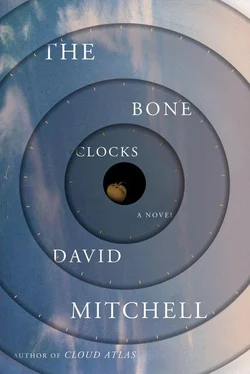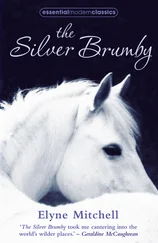I think about Martin’s remarks on imaginary lifeboats.
“I’m only passing on what I’ve been told,” sniffs Pat Joe.
“Whatever the future has in store,” says Betty Power, “we’re all in the hollow of God’s hand, so we are.”
“That’s certainly how Muriel Boyce sees it,” says Seamus Coogan.
“Martin’s doing his best,” says Betty Power, crisply, “but it’s clear that only the Church can take care of the devilry falling over the world.”
“Why will a loving God only help us if we vote for him?” asks Molly.
“You have to ask,” blinks Betty Power. “That’s how prayer works.”
“But Molly’s saying,” says Pat Joe, “why can’t He just answer our prayers directly? Why does he need us to vote for him?”
“To put the Church back where it belongs,” says Betty Power. “Guiding our country.”
The conversation heats up but I may as well be listening to children arguing about the acts and motives of Santa Claus. I’ve seen what happens after death, the Dusk and the Dunes, and it was as real to me as the chipped mug of tea in my hand. Perhaps the souls I saw were bound for an afterlife beyond the Last Sea, but if so, it’s not the afterlife described by any priest or imam. There is no God but the one we dream up, I could assure my fellow parishioners: Humanity is on its own and always was …
… but my truth sounds no crazier than their faith, no saner either; and who has the right to kill Santa? Specially a Santa who promises to reunite the Coogans with their dead son, Pat Joe with his dead brother, me with Aoife, Jacko, Mum, and Dad; and even put the Endarkenment into reverse, and bring back central heating, online ordering, Ryanair, and chocolate. Our hunger for our loved ones and our lost world is as sharp as grief; it howls to be fed. If only that same hunger didn’t make us so meekly vulnerable to men like Father Brady.
“Fallen pregnant?” Betty Power covers her mouth. “Never!” We’re back to Sheep’s Head gossip. I’d like to ask who’s pregnant, but if I do so at this point they’ll all wonder if I’m going deaf or turning senile.
“That’s the problem.” Sinéad Fitzgerald leans in. “Three lads went off with young Miss Hegarty after the harvest festival, they were all off their faces”—she mimes smoking a joint—“so until the baby’s features are clear enough to play Spot the Daddy, Damien Hegarty doesn’t know who to point the shotgun at. A proper mess it is.”
The Hegartys keep goats lower down the peninsula, between Ahakista and Durrus. “Shocking,” says Betty Power, “and Niamh Hegarty not a day over sixteen, too, am I right? No mother in the house to lay down the rules, that’s what this is about. They just think anything goes. Which is exactly why Father Brady’s—”
“Hear that,” says Pat Joe, holding up a finger and listening …
… cups are poised in midlift; sentences dangle; babies are shushed; nearly two hundred West Corkonians fall silent, all at once; and then let out a collective sigh of relief. It’s the Convoy: two armored jeeps, ahead of and behind the diesel tanker and the box truck. Inside the Cordon we still have tractors and harvesters, and Stability vehicles still drive on the old N71 to Bantry to service the garrisons and the depots, but these four shiny state-of-the-art vehicles rumbling up Church Lane are the only regular visitors to Kilcrannog. For anyone over Rafiq’s age, say, the sound evokes the world we knew. Back then, traffic was a “noise,” not a “sound,” but it’s different now. If you close your eyes as the Convoy arrives you can imagine it’s 2030, say, back when you had your own car and Cork was a ninety-minute drive away, and my body didn’t ache all the time, and climate change was only a problem for people who lived in flood-prone areas. Only I don’t close my eyes these days, because it hurts too much when I open them. We all go outside to watch the show. I take my pram. It’s not that I don’t trust the villagers not to steal from an old lady with two kids to raise, but you shouldn’t tempt hungry people.
THE HEAD JEEP pulls up past the diesel store. Four young Irish Stability troops jump out, enjoying the impact their uniforms, guns, and swagger makes on the yokels; it’s not by chance that Kilcrannog’s single girls wear their dwindling supplies of makeup and best clothes on Convoy Days. Corinna Kennedy from Rossmore Farm married a Convoyman and now she’s living in the Bandon garrison with five hours of electricity a day. The head Irish guard speaks rapid-fire “Mandlish” into his transband to confirm their current position to the Main Convoy. “Each of them helmets’d cost more than my house,” Pat Joe tells me, not for the first time, “if you had the contacts to turn it into hard yuan.”
Three Chinese troops jump down from the rear jeep, in the uniforms of the Pearl Occident Company, or POC. They are taller than their Irish counterparts, their teeth are better, and their guns are more, as teenage Aoife would’ve said, badass. The Irish troops will chat a little, but the Chinese troops are under orders not to fraternize with the locals. Bantry is the western, wilder end of the Lease Lands, and the diesel they’re delivering is more precious than gold. One of the Irishmen spots Kevin Murray’s lit pipe too close to the tanker and barks, “Sir, we need you to put that pipe out right now!” Mortified, Kevin shuffles back into the Big Hall. Convoymen never need to threaten. The Convoys are our umbilical cord to the Ringaskiddy depot and its special items, no longer manufactured in Ireland, or anywhere in Europe, for all we know.
The two week in, week out Convoymen are Noel Moriarty, the tankerman, and Seamus Li, the chief merchant. Noel Moriarty, a busy-eyed, quick-witted, pale, and balding man in his midthirties, shakes hands and chats with Martin while the driver fits nozzle to intake. Martin asks Noel if he has any information about Hinkley Point. Noel says his POC boss told him the Chinese are monitoring the site from low-altitude satellites, but the whole complex appears to have been deserted. This news flies round the onlooking crowd in less than a minute, but as ever it’s difficult to draw reliable conclusions from such scant facts. Noel Moriarty and Martin sign each other’s clipboards, then the tankerman pulls the red handle that starts the flow of diesel into the Co-op tank. We try to catch a whiff of the stuff, and suffer a fresh round of pangs for the Petrol Age.
The box truck, meanwhile, has backed into the Co-op warehouse across the square, where Seamus Li speaks with Olive O’Dwyer, Kilcrannog’s deputy mayor. Items loaded onto the truck are mostly farm produce; from the deep freeze come recently slaughtered beef, bacon, turkey, rabbit, mutton, and lamb, and from the fresh store come boxes of cured tobacco, leeks, kale, onions, potatoes, pumpkins, and late fruit. Most of the fruit and vegetables will feed the Ringaskiddy Concession, where the POC officials live with their families, or the crews of the People’s Liberation Navy’s Atlantic Fleet. The meat, uncloned and cesium-free — so far — will be sold for jaw-dropping prices in Beijing, Chongqing, and Shanghai. Milk is powdered at Ringaskiddy, and is a major export.
In return, the three Sheep’s Head Co-ops of Durrus, Ahakista, and Kilcrannog receive diesel, fertilizer, insecticide, machine parts, lightbulbs, tools, hardware, as well as the special requests — including vital medicines like Rafiq’s insulin — agreed upon every month by the town committee. The POC also has a deal with Cork Stability to deliver the basic commodities for our weekly ration boxes, though the quality of these has been going downhill in recent months. The most important item delivered by the Company, however, is security. The POC protects its Lease Lands by paying for the Stability Militia to man the sixty-mile Cordon, which is why the ten-mile coastal strip from Bantry to Cork has been spared the worst of the lawlessness that plagues much of Europe as the Endarkenment switches off power networks and emaciates civic society. The men in Fitzgerald’s bar mutter that the Chinese aren’t here out of love, and that the POC is no doubt turning a tidy profit from its operation, but even the drunkest lout can imagine how savage life on Sheep’s Head would soon become without the three Cs: Company, Convoy, and Cordon.
Читать дальше












